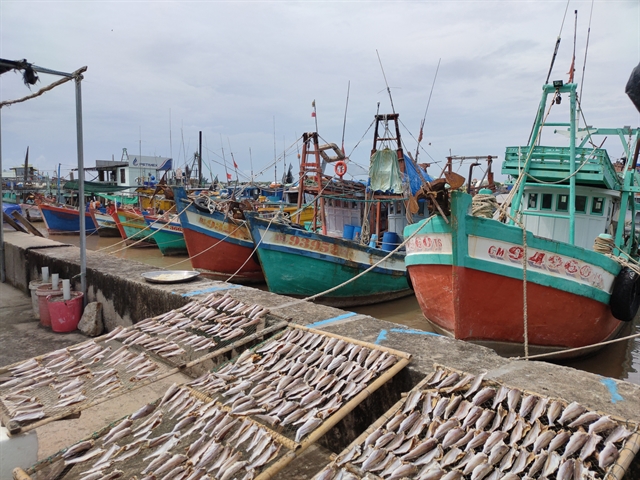 Society
Society

Many fishing boats in the Cửu Long (Mekong) Delta province of Bạc Liêu earn little money or are even losing because of the increases in fuel prices and other expenses.

|
| Many fishing boats in Bạc Liêu Province’s Đông Hải District have stopped going out to sea because of high costs. – VNA/VNS Photo Tuấn Kiệt |
BẠC LIÊU – Many fishing boats in the Cửu Long (Mekong) Delta province of Bạc Liêu earn little money or are even losing because of the increases in fuel prices and other expenses.
With a coastline of 56km with four large rivers running into the sea, Sóc Trăng has nearly 400,000sq.km of fishing grounds with a number of aquatic species.
It has more than 1,200 fishing boats which catch more than 100,000 tonnes of seafood annually, with Đông Hải District accounting for 600 vessels, the highest number.
Đặng Quốc Thùy, a boat owner in Đông Hải’s Gành Hào Town, said the cost of his latest fishing trip was VNĐ60 million (US$2,600) higher than before, VNĐ50 million for fuel and the rest for food and testing his crew for COVID–19.
He earned nothing from it, he said.
Together with a fall in seafood prices and demand volatility amid the travel restrictions, the increased costs have caused many boat owners to stop fishing.
Nguyễn Hồng Quang, another boat owner in Gành Hào Town, said the fuel costs for a one-month fishing trip by a high-capacity boat has increased by VNĐ40–70 million ($1,760–3,100).
Nearly 70 per cent of boats in Đông Hải have stopped fishing, according to the district Bureau of Agriculture and Rural Development.
The district targeted a catch of 70,000 tonnes this year, but that would be difficult to achieve in the current situation, it said.
Phạm Thanh Hải, deputy director of the provincial Department of Agriculture and Rural Development, said the current difficulties are temporary and not all fishing boats are suffering losses.
To resolve the difficulties, the department has encouraged fishermen to form more groups to reduce costs and improve their efficiency.
The province has 81 such groups now with a total of 408 fishing boats and 3,000 fishermen.
Forming groups has helped improve efficiency by enabling boats to remain at sea for longer periods and assist those having mishaps.
The province encourages fishermen to acquire high-capacity boats for off-shore fishing, switch to catching high-value species and use advanced technologies for preserving their catch to improve quality and reduce losses. – VNS